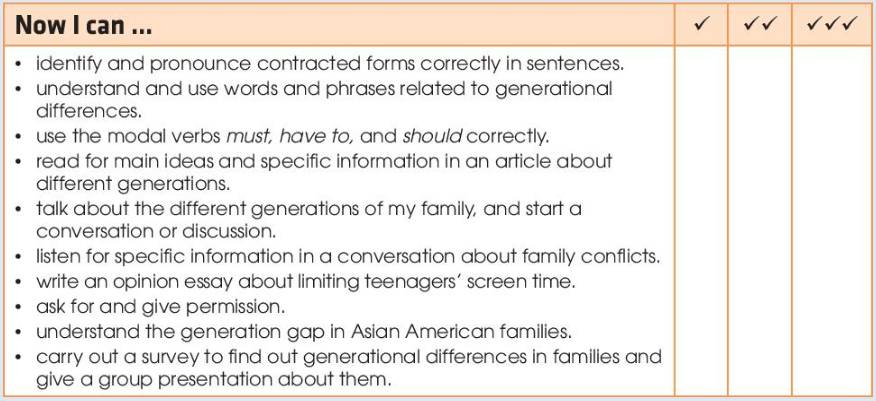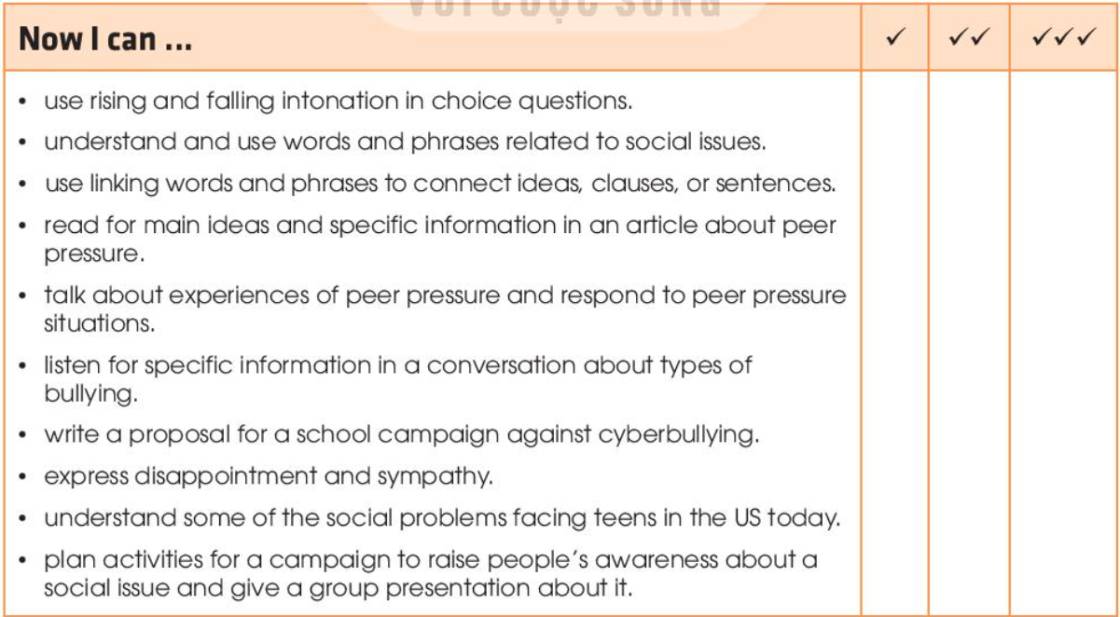 Friendship flower.
Friendship flower.
Work in groups. Write two personality adjectives for each group member.

Exercise 3. STAND IN ORDER. Work in groups. Each student chooses an animal from page 38. Write your animal on a piece of paper. Look at the adjectives in the box. One person says a superlative, for example, 'the fastest!'. Stand in order, with the fastest animal on the left. Then repeat the activity with a different adjective.
(ĐỨNG THEO THỨ TỰ. Làm việc nhóm. Mỗi học sinh chọn một con vật từ trang 38. Viết con vật của bạn trên một mảnh giấy. Nhìn vào các tính từ trong khung. Một người nói câu so sánh nhất, chẳng hạn, 'nhanh nhất!'. Đứng theo thứ tự, với con vật nhanh nhất ở bên trái. Sau đó lặp lại hoạt động với một tính từ khác.)
big fast dangerous heavy intelligent rare pretty ugly |
The fastest!: CAT, OSTRICH, BEARS, FISH
(Nhanh nhất: mèo, đà điểu, gấu, cá)

- The biggest: elephant, tiger, gorilla, giraffe.
(To nhất: voi, hổ, đười ươi, hươu cao cổ)
- The ugliest: crocodile, spider, gorilla, octopus
(Xấu xí nhất: cá sấu, nhện, đười ươi, bạch tuộc)
GAME Matching game. Work in two groups, A and B. Group A write main clauses. Group B write adverb clauses of time.
Do they match? Are there any funny sentences?

Don’t use the cell phone while you are driving.
(Đừng sử dụng điện thoại di động khi đang lái xe.)
As I was walking down the street, I saw James driving a Porsche.
(Khi tôi đang đi trên đường, tôi thấy James đang lái con xe Porsche.)
He went to work after he fed the cats.
(Anh ấy đi làm sau khi cho mèo ăn.)
He went abroad after he finished his studies.
(Anh ấy ra nước ngoài sau khi hoàn thành việc học.)
Bring me some water before you go.
(Đem cho tôi ít nước trước khi cậu đi.)
They were told to wait till the signal was given.
(Họ được nói là đợi đến khi tín hiệu được đưa ra.)
I will wait here until you arrive.
(Tôi sẽ chờ ở đây cho đến khi bạn đến.)
As soon as he heard the news, he called me.
(Anh ấy gọi cho tôi ngay khi nghe được tin.)
Just as he entered the room the clock struck.
(Đồng hồ kêu ngay khi cậu ta vừa bước vào phòng.)
Divide the class into 4-5 groups. Each group choose two words from the list below and work out a description for each word. The groups take turns reading the description aloud. The other groups try to guess what word is it. The group with the most correct answers wins.
Dịch đoạn văn này.
Dịch bài:
Chia lớp thành 4-5 nhóm. Mỗi nhóm chọn hai từ trong danh sách dưới đây và mô tả từng từ. Các nhóm luân phiên đọc to mô tả. Các nhóm khác cố gắng đoán từ đó là gì. Nhóm có câu trả lời đúng nhất sẽ thắng.
Chúc bạn hok tốt
Chia lớp thành 4-5 nhóm. Mỗi nhóm chọn hai từ trong danh sách dưới đây và mô tả từng từ. Các nhóm luân phiên đọc to mô tả. Các nhóm khác cố gắng đoán từ đó là gì. Nhóm có câu trả lời đúng nhất sẽ thắng.
GENERATIONAL DIFFERENCES AMONG US
Work in groups. Each member of your group should ask three people from different generations to complete the survey below.
These people could include:
- a classmate or brother/sister,
- a mother/father, or someone of their generation,
- a grandma/grandpa, or someone of their generation.
Your presentation should summarise the survey results.
| Questions | Person 1 | Person 2 | Person 3 |
1. | What is/are your favourite...? |
|
|
|
| music |
|
|
|
| clothes |
|
|
|
| TV programmes |
|
|
|
| hobbies |
|
|
|
| place to live |
|
|
|
2. | Do you think there is a generation gap in your family? If yes, how do you deal with it? |
|
|
|

Work in groups. Your class is starting a campaign to raise people's awareness about different social issues in your community. Each group is responsible for planning activities for one social issue.
Give a group presentation. Use these questions as cues.
- What is the social issue? How does it affect the community?
- Who will participate in your campaign? Who can help to fix this issue?
- What activities do you plan to include in your campaign? What are their goals?


Respected Principal, teachers and my dear friends, a wonderful morning to all of you. Today on this special occasion, I would like to speak some words on the topic- Bullying.
Bullying is a rising problems in educational institutions everywhere. It refers to the assertion of dominance over an individual by displaying aggressive behaviour towards them. It can either involve physical or verbal abuse, or both. And this increasingly digital age, cyber bullying is the greatest evil of them all.
Bullying leads to irreversible harm, causing feelings of depression, anxiety, alienation and even suicidal impulses in the victim. The trauma of bullying can affect someone’s entire life, so we must take strict steps to prevent it! Raising awareness about bullying is the first step towards combatting it. In addition, all bullies must be severely punished.
To conclude, we must all do our best to prevent bullying! Thank you for listening to me so attentively.
USE IT! Work in groups. Each group writes three questions about books using passive voice, then reads out for the others to answer. The group with the most correct answers is the winner.

The first question is who was De Men phiêu lưu ký written by?
I think the answer is To Hoai.
The second question is when was Lao Hac written?
I think it was written in 1943.
The third question is: Was the poem Ong do written by Ho Chi Minh?
No, It wasn’t. It was written by Vu Dinh Lien.
Read the following passage and mark the letter A, B, C, or D on your answer sheet to indicate the correct answer to each of the following questions.
According to sociologists, there are several different ways in which a person may become recognized as the leader of a social group in the United States. In the family, traditional cultural patterns confer leadership on one or both of the parents. In other cases, such as friendship groups, one or more persons may gradually emerge as leaders, although there is no formal process of selection. In larger groups, leaders are usually chosen formally through election or recruitment.
Although leaders are often thought to be people with unusual personal ability, decades of research have failed to produce consistent evidence that there is any category of “natural leaders '" It seems that there is no set of personal qualities that all leaders have in common; rather, virtually any person may be recognized as a leader if the person has qualities that meet the needs of that particular group.
Furthermore, although it is commonly supposed that social groups have a single leader, research suggests that there are typically two different leadership roles that are held by different individuals. Instrumental leadership is leadership that emphasizes the completion of tasks by a social group. Group members look to instrumental leaders to “get things” done. Expressive leadership, on the other hand, is leadership that emphasizes the collective well-being of a social group’s member. Expressive leader are less concerned with the overall goals of the group than with providing emotional support to group members and attempting to minimize tension and conflict among them. Group members expect expressive leaders to maintain stable relationships within the group and provide support to individual members.
Instrumental leaders are likely to have a rather secondary relationship to other group members. They give orders and may discipline group members who inhibit attainment of the group’s goals. Expressive leaders cultivate a more personal or primary relationship to others in the group. They offer sympathy when someone experiences difficulties or is subjected to discipline, are quick to lighten a serious moment with humor, and try to resolve issues that threaten to divide the group. As the differences in these two roles suggest, expressive leaders generally receive more personal affection from group members; instrumental leaders, if they are successful in promoting group goals, may enjoy a mote distant respect.
It can be understood that________
A. Leaders are sometimes chosen formally or informally.
B. There is lots of tension and conflict in an election of a leader in the family.
C. There is usually an election to choose leaders in a family as well as in larger groups.
D. It has been said that there must be a set of personal qualities that all leaders have in common.
Đáp án là A
Ý trong bài: In other cases, such as friendship groups, one or more persons may gradually emerge as leaders, although there is no formal process of selection. => informally
In larger groups, leaders are usually chosen formally through election or recruitment.
Read the following passage and mark the letter A, B, C, or D on your answer sheet to indicate the correct answer to each of the questions.
According to sociologists, there are several different ways in which a person may become recognized as the leader of a social group in the United States. In the family, traditional cultural patterns confer leadership on one or both of the parents. In other cases, such as friendship groups, one or more persons may gradually emerge as leaders, although there is no formal process of selection. In larger groups, leaders are usually chosen formally through election or recruitment.
Although leaders are often thought to be people with unusual personal ability, decades of research have failed to produce consistent evidence that there is any category of “natural leaders.” It seems that there is no set of personal qualities that all leaders have in common; rather, virtually any person may be recognized as a leader if the person has qualities that meet the needs of that particular group.
Furthermore, although it is commonly supposed that social groups have a single leader, research suggests that there are typically two different leadership roles that are held by different individuals. Instrumental leadership is leadership that emphasizes the completion of tasks by a social group. Group members look into instrumental leaders to “get things done.” Expressive leadership, on the other hand, is leadership that emphasizes the collective well-being of a social group’s member. Expressive leader are less concerned with the overall goals of the group than with providing emotional support to group members and attempting to minimize tension and conflict among them. Group members expect expressive leaders to maintain stable relationships within the group and provide support to individual members.
Instrumental leaders are likely to have a rather secondary relationship to other group members. They give orders and may discipline group members who inhibit attainment of the group’s goals. Expressive leaders cultivate a more personal or primary relationship to others in the group. They offer sympathy when someone experiences difficulties or is subjected to discipline, are quick to lighten a serious moment with humor, and try to resolve issues that threaten to divide the group. As the differences in these two roles suggest, expressive leaders generally receive more personal affection from group members; instrumental leaders, if they are successful in promoting group goals, may enjoy a mote distant respect
What does the passage mainly discuss?
A. The role of leaders in social groups
B. How social groups determine who will lead them
C. The problems faced by leaders
D. How leadership differs in small and large groups
Đáp án A
Ý chính của đoạn văn tập trung vào làm rõ vai trò của người lãnh đạo trong các tổ chức, đội
nhóm xã hội
Read the following passage and mark the letter A, B, C, or D on your answer sheet to indicate the correct answer to each of the following questions.
According to sociologists, there are several different ways in which a person may become recognized as the leader of a social group in the United States. In the family, traditional cultural patterns confer leadership on one or both of the parents. In other cases, such as friendship groups, one or more persons may gradually emerge as leaders, although there is no formal process of selection. In larger groups, leaders are usually chosen formally through election or recruitment.
Although leaders are often thought to be people with unusual personal ability, decades of research have failed to produce consistent evidence that there is any category of “natural leaders '" It seems that there is no set of personal qualities that all leaders have in common; rather, virtually any person may be recognized as a leader if the person has qualities that meet the needs of that particular group.
Furthermore, although it is commonly supposed that social groups have a single leader, research suggests that there are typically two different leadership roles that are held by different individuals. Instrumental leadership is leadership that emphasizes the completion of tasks by a social group. Group members look to instrumental leaders to “get things” done. Expressive leadership, on the other hand, is leadership that emphasizes the collective well-being of a social group’s member. Expressive leader are less concerned with the overall goals of the group than with providing emotional support to group members and attempting to minimize tension and conflict among them. Group members expect expressive leaders to maintain stable relationships within the group and provide support to individual members.
Instrumental leaders are likely to have a rather secondary relationship to other group members. They give orders and may discipline group members who inhibit attainment of the group’s goals. Expressive leaders cultivate a more personal or primary relationship to others in the group. They offer sympathy when someone experiences difficulties or is subjected to discipline, are quick to lighten a serious moment with humor, and try to resolve issues that threaten to divide the group. As the differences in these two roles suggest, expressive leaders generally receive more personal affection from group members; instrumental leaders, if they are successful in promoting group goals, may enjoy a mote distant respect.
What does the passage mainly discuss?
A. The role of leaders in social groups
B. How social groups determine who will lead them
C. How leadership differs in small and large groups
D. The problems faced by leaders
Đáp án là A
Từ role - vai trò, thường có ý bao quát nên ta chọn làm ý chính. Có thể dưa vào nội dung đoạn 1
để chọn đáp án này.